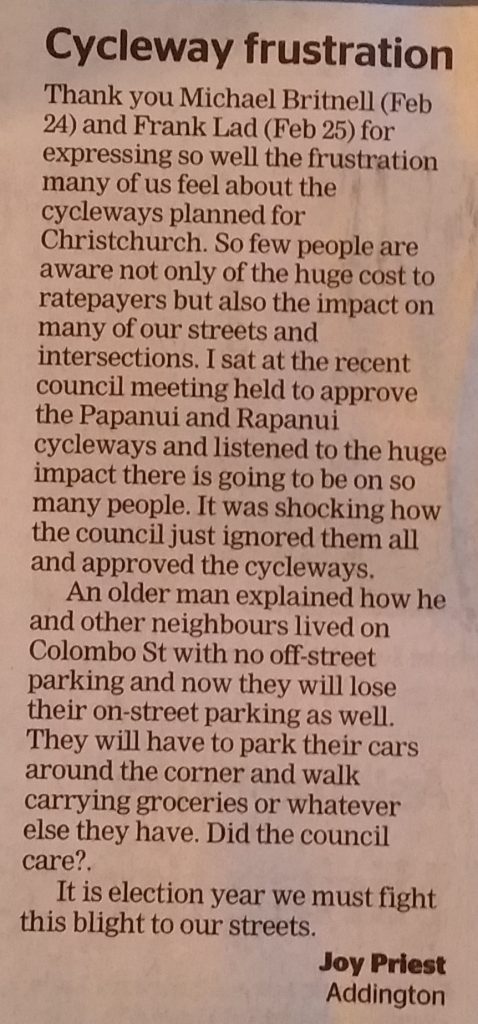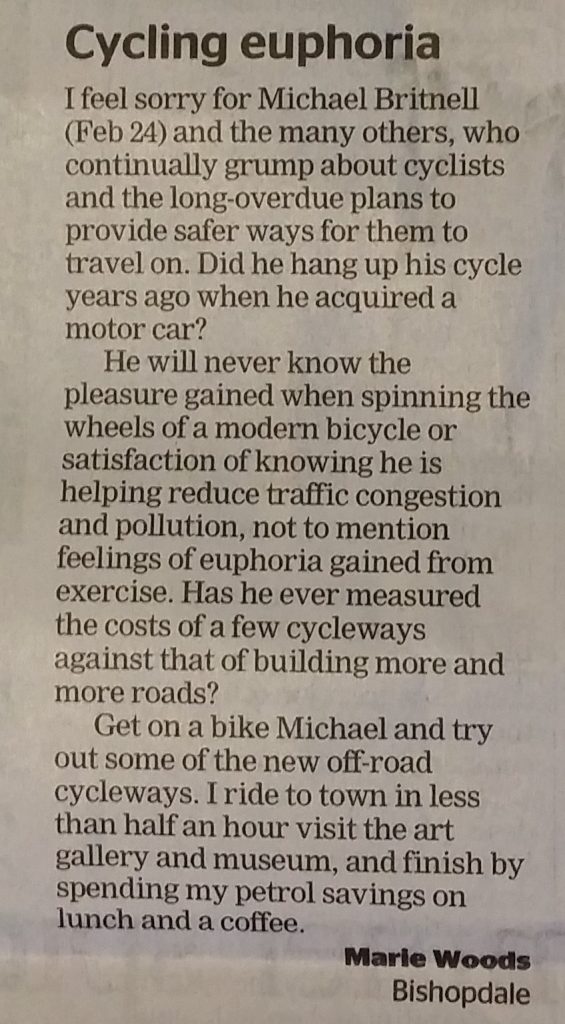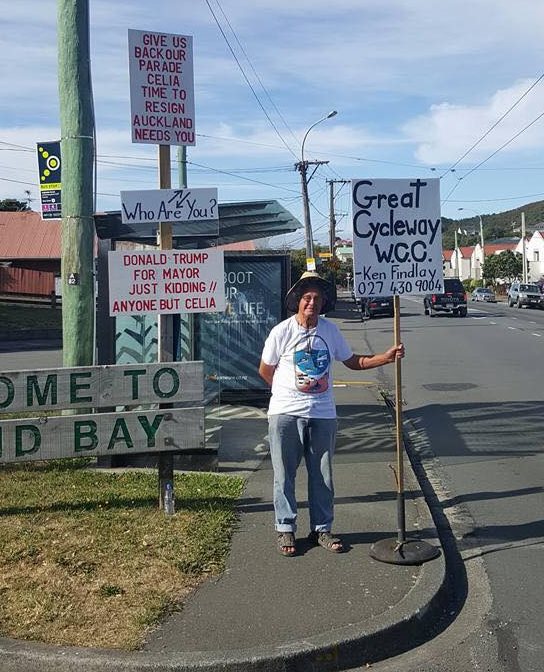
There’s been a flurry of letters lately in The Press about cycleways. While many of them have been grumbling about some aspect of the proposed Major Cycleways, it’s heartening to see a few firing back with their support for them. It got me wondering whether politicians take much notice of these as another indicator of the general public mood for cycling.
Aside from their own preconceived notions and Council officer information, it seems to me that politicians could be influenced by a number of different factors:
- Feedback from formal consultation (including public meetings)
- Media publishing, including news articles, opinion pieces, and letters to the Editor
- Feedback from social media channels (Facebook, Twitter, online discussions, etc)
- Direct communications from people (face-to-face, email, phone, letters)
We seem to have at least been spared here in Christchurch the worst of media trying to make a beat-up of everything cycle-related, as places like Wellington are currently finding. But The Press has been known to run things with a hint of a controversy in the past, so we do need to keep vigilant for trumped-up outrage.
Consultation is a funny game; sometimes it’s about numbers, sometimes it’s not. I’m never quite sure how much weight politicians (or staff) place in the feedback they receive. Here’s the thing: people are more likely to submit on something that impacts unfavourably on them than on something that they favour. So if in a street of 100 houses we get 10 submissions for a proposal and 20 submissions against it, should we presume that twice as many street residents are against the proposal? I tend to take the more optimistic view that the remaining 70 who didn’t respond most likely didn’t because either (a) they supported it, or (b) they didn’t care either way. Meanwhile, what about the 200 people who don’t live on the street but cycle along it every day – do they get an equally weighted vote in the deliberations of your typical politician? Either way, as we’ve mentioned before, there are plenty of good reasons for making submissions (particularly in support of things), at least in writing if not in person too.

Likewise, social media seems to attract plenty of trolls and haters, so you do have to remind yourself that it is probably not representative of the public at large. Still, if you’re keen, it can’t hurt to ‘fight the good fight’ and tackle the obvious clangers that come up in these discussions. For more advice, have a look at our earlier discussion on this. I feel it’s an interesting measure of cycling culture too, e.g. a cycling-related story in Christchurch seems to attract far fewer moaners and down-voters than a similar story elsewhere in New Zealand – that tells me that as a city we are already far more accepting of cycling as part of our fabric (but of course, it could always be better…).
Letter writing can seem like a dying art, but I find that the daily spread of Letters to the Editor in The Press provides an interesting snapshot on the state of people’s thinking. And occasionally I like to take part in the game too. Some things to remember about letters:
- Like all forms of feedback, it’s even more powerful when you can relate personally to the matter at hand. I could (and do) write plenty of supportive things about projects like the Papanui Parallel cycleway, but the simple fact is that I don’t live on that side of town and I don’t have regular occasion to use that route. That’s why it great that locals like Robert can provide that closer-to-home perspective. You might not think that you can write eloquent words of wisdom, but often far more important is that you can truly speak from personal experience.
- Those of us who already cycle regularly (and confidently) need to remember that mostly these proposed cycleways are not about us. Sometimes I see comments to the effect of “I cycle and I don’t see why they’re spending so much on this cycleway when a cheaper cycle lane would suffice”. That may indeed work for you, but there’s every chance it will do little to attract the “interested but concerned” who need a bit more encouragement. If you can’t understand this viewpoint, go and chat to someone who doesn’t currently cycle but would like to.
- Newspaper letters invariably have some rules about word limits and formatting styles. Having a big rant about everything in general usually doesn’t make good copy; it’s better to focus on 2-3 key points and get those across (heck, even one really good point…). That’s where word limits can help to focus the mind. Following the “house rules” about content and format also improve your chances of getting published.
- Sometimes you won’t get published (and some rubbishy letter will…) – that’s life. About three weeks ago someone cynically queried whether we should count all the cyclists in Christchurch to work out whether these cycleways are worth it. I immediately shot out a reply to The Press, but it never saw the light of day (reproduced above for your edification). Maybe some other topic suddenly became flavour of the moment; maybe the Editor didn’t care for my letter. I don’t know, but I won’t lose sleep over it – onto the next battle.

The key message here is that everyone can do their little bit to help support the Major Cycleways and other cycling-relevant projects. Flood the newspapers with letters of support. Put in that simple submission to Council ticking the “yes” box and saying why you like it (reminder that the Uni-Cycle consultation closes next week). Up-vote the online cheerleaders and rebut the nay-sayers. Congratulate a City Councillor (either in person or in writing) when they vote for a great project. If people start to see as much positive energy for cycling as all the negative energy, they may decide that these bikes aren’t so bad after all.
Have you contributed to public discussion about cycling? What are your tips?


I’ve been thinking for the last couple of weeks about writing a letter to the Mayor and the team leader responsible for cycle ways thanking them. They get lots of stick from business owners apparently who resent the parking spaces near that are taken away by cycle ways. Apparently the big argument is that cyclists will cycle regardless so shouldn’t be supplied with dedicated paths. I certainly cycle more now that the paths are there and it’s important to make sure our voices are heard to. Thanks for a great article, was just the prompting I needed. Maybe a letter to the editor too.